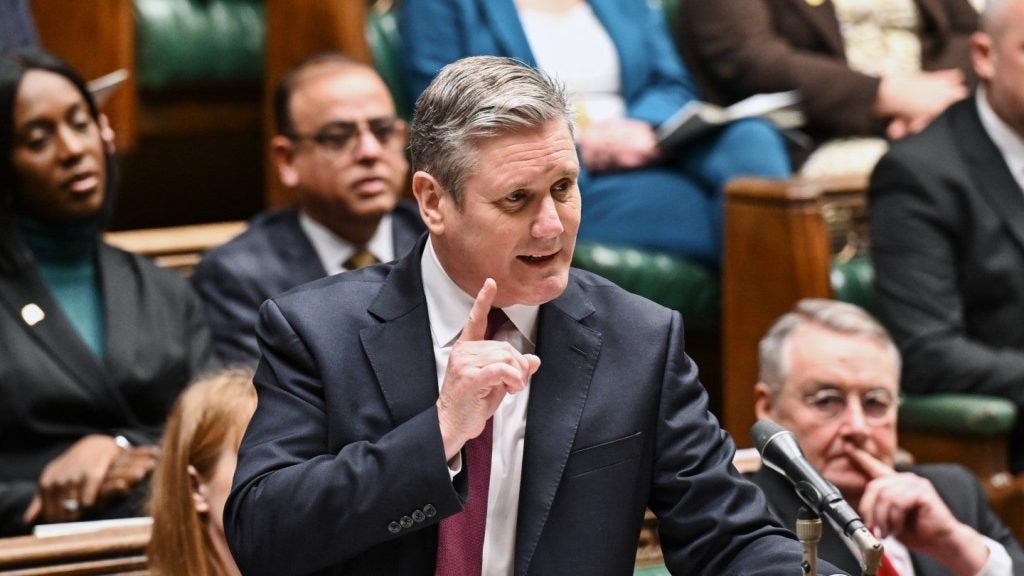With current polls forecasting a comfortable win for Labour in the UK’s upcoming general election, there is speculation on how the party’s policies will affect the UK economy and industry.
Labour is promising to “stop the chaos and support business through a stable policy environment” to strengthen economic institutions, and to create more certainty for business investors, with a strong cross-party consensus on supply-side policies also offering more continuity.
GlobalData’s 2024 UK Election Briefing, which follows its recent Deep Dive into the 2024 US Elections, unpacks the latest polling figures and how the incoming government’s policy could impact key sectors such as automotive, retail, consumer and financial services.
Polling naturally varies, but YouGov is currently forecasting a record-breaking landslide for Labour, with a vote share of 39% and 425 seat wins out of a possible 650. It has the Conservatives next on 22% and 108 seats, which would represent the party’s lowest seat total in history. In addition to the Conservatives’ own problematic incumbent governance in recent years, these figures are due in part to the likely erosion of the Conservative vote by the Reform UK party, led by Nigel Farage.
Political and economic
Analysing the UK’s political history, the GlobalData briefing lays out the various macroeconomic supercycles that have dictated the country’s history since 1945. From 1945 to 1989 there was a “social democratic supercycle”, which was replaced by a “neoliberal supercycle” when Margaret Thatcher took power in 1979.
Leading up to the current election, there is speculation about whether, after so long under neoliberalism, a new Labour government could trigger a new macro supercycle in reaction to Conservative austerity’s hollowing out of the economy.
The briefing suggests that, although there could be a shift in supercycles: “The 2024 UK general election seems more like a case of mere ‘elite rotation’,” meaning a broad continuity in policy agenda but now implemented by a different set of players. This, it says, is due to the cautious policy prospectus of the incoming government as opposed to the radical measure introduced in the 1980s, which shifted the UK’s economic supercycles.
Financial services
Of how Labour’s policies will affect the banking and payments sector, the briefing highlights that there would likely be a greater focus on access to cash.
Data quoted from GlobalData’s Payment Instrument Analytics highlights that, in 2014, cash accounted for 46% of all UK transactions, while in 2024 this stands at 11%, and it is forecast to fall to 7% in 2028.
Although these figures highlight the declining prominence of cash in UK society, the Labour Party is conscious of the role of cash as a payment method for those uncomfortable with using digital banking products or those with a preference for cash payment for better budgeting.
To safeguard the right to use cash and foster financial inclusion, Labour has drawn up plans for banking hubs and potentially will look at regulations which might guarantee cash payment options which could have a myriad of implications across many sectors.
The briefing suggests that, despite Labour’s ambitions, with the current state of the UK’s retail banking sector and continual branch cuts, they may find it difficult to accelerate progress on banking hubs.
Consumer and retail
Although facing a tough business environment, the briefing suggests a Labour government would still be unlikely to significantly cut taxes on businesses.
Instead, it details that the party is likely to focus on smaller businesses by freezing rates and extending the relief threshold. There are also suggestions that business rate cuts for smaller shops could be paid for by taxes on online retail giants, but the party’s position on this remains unclear.
Labour’s plans for the labour market include strengthening trade unions, pushing for bigger minimum wage increases, banning zero-hour contracts and ‘fire-and-rehire’ practices and eliminating qualifying time for sick pay, parental leave and flexible working.
These changes, although providing much-needed improvements for worker’s rights in the retail and consumer sectors, would likely increase costs for retailers while reducing workplace flexibility.
Automotive
Currently, the UK is the fourth biggest automotive producer in Western Europe, assembling over 1 million light vehicles in 2023 and housing vehicle assembly operations for seven key OEMs including Nissan, BMW, Toyota and Tata.
Labour’s environmental regulation has the potential to heavily impact the automotive sector, with the Zero Emissions Vehicle (ZEV) mandate being an already tough target for the industry.
The briefing suggests that Labour will modify their 2030 Internal Combustion Engine (ICE) ban commitment to bring it in line with the current Conservative government’s 2035 ZEV target, which is in line with EU regulations. This is because, without a substantial government subsidy to drive ZEV adoption by 2030, the UK’s market potential could be reduced.
A switch by Labour to align the target with the EU would protect the automotive industry to some extent, as the electrification transition progresses through the industry.
Elsewhere, Labour’s policies to address the high energy prices for businesses could provide upside risk to the automotive market and domestic industry capacity.









